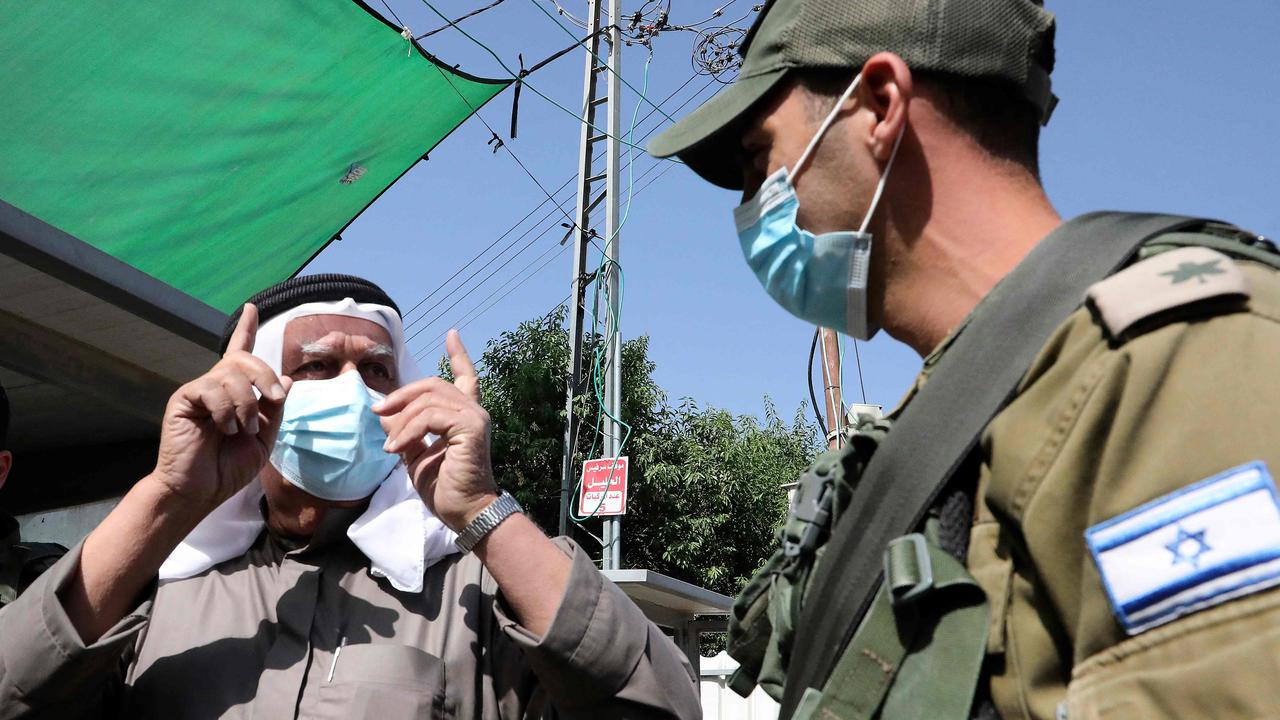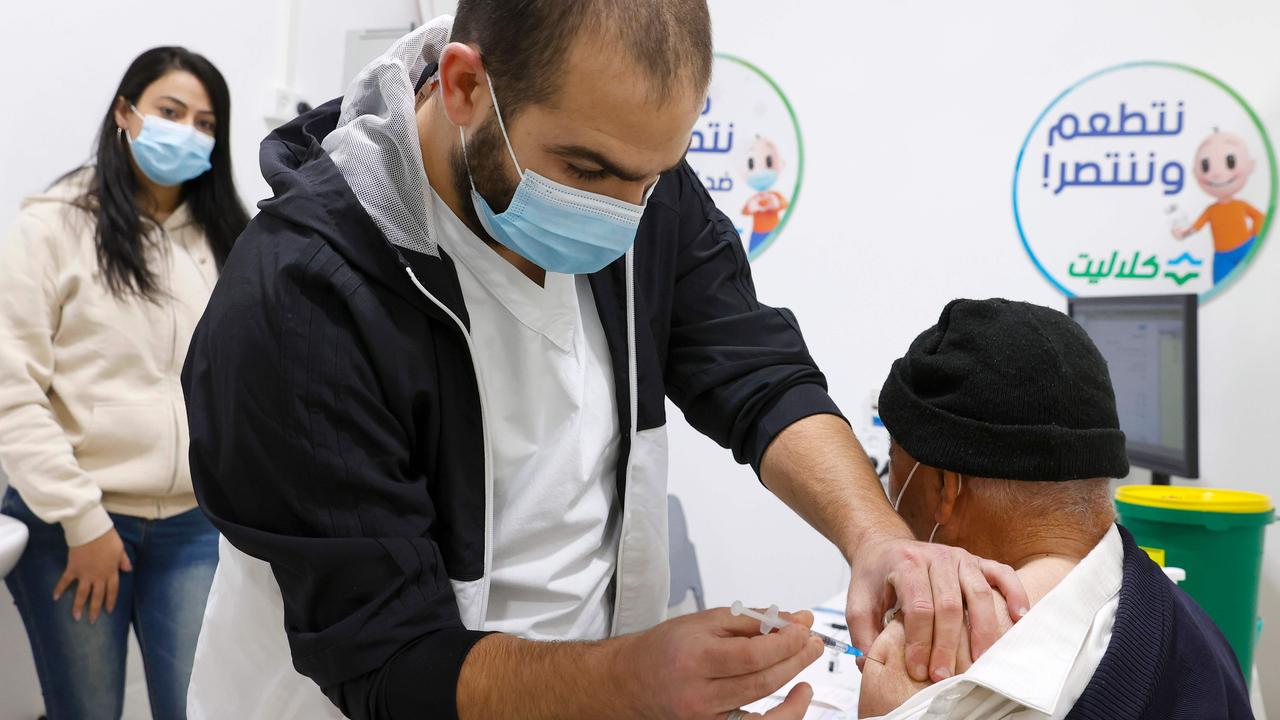Israel’s vaccination success raises hopes it may have achieved herd immunity
Israel looks like it may have achieved herd immunity with its aggressive vaccination program — and it could spell good news for Australia.

Israel looks like it may have achieved herd immunity, with its aggressive vaccination program helping the country achieve a staggering decrease in coronavirus cases.
The continuing decline in cases, despite the easing of lockdown restrictions, is being hailed as proof vaccination does work and the country may even have achieved herd immunity.
The country of about nine million people began rolling out Pfizer vaccinations in December around the time its third and largest wave of COVID-19 infections began to take off, with a record high of 11,934 cases on January 27.
However, Israel has since managed to get its cases under control, with the European Union on Thursday adding it to its list of safe countries that can freely travel to Europe for tourism, alongside Australia, South Korea, Singapore and Thailand.
Israel has undertaken the most rapid per capita vaccination campaign in the world, with about five million people receiving both jabs in less than four months.
The fast-tracked strategy looks to have paid off, helping to bring infections down rapidly even after restrictions were eased.
On Thursday, the largest real-world study of the Pfizer vaccine published in The Lancet medical journal confirmed the jab had provided more than 95 per cent protection against COVID-19 in Israel, providing hope of a pathway out of the pandemic.
“56% fully vaccinated in Israel & persistent decline without kids vaxxed yet. Looks like herd immunity,” Monash University infectious diseases lecturer Dr Michelle Ananda-Rajah tweeted on Sunday.
Last month Professor Eyal Leshem, a director at Israel’s largest hospital, the Chaim Sheba Medical Centre, told the BBC the country may be close to reaching “herd immunity”.
He said it was the “only explanation” for Israel’s continued fall in cases as more restrictions were lifted.
Deakin University epidemiologist Professor Catherine Bennett told news.com.au Israel was showing “fantastic results”.
“They still had thousands of cases when they began progressively opening up,” she said.
“That tells you what vaccines are able to do.”
Israel progressively tightened restrictions from the end of December as coronavirus cases climbed higher in January before relaxing them in early February.
At its peak the seven-day moving average reached 8328 new infections per day and was still at almost 7000 cases on February 7 when restrictions began to be eased.
However, cases continued to drop, giving the government confidence to ease restrictions further, including dropping the use of masks in open spaces.
By April 19 the average had dropped to about 149 cases a day, “indicating effective control of the pandemic within the country’s borders”, Prof Leshem and Professor Annelies Wilder-Smith of the London School of Hygiene and Tropical Medicine noted in a commentary piece in The Lancet.
Significantly Prof Bennett said the results published in TheLancet on Thursday indicate the Pfizer vaccine was controlling transmission between people, including those without symptoms. This indicates herd immunity may be possible.
The results showed the vaccine was 95.3 per cent effective against COVID-19 infection at seven days or longer after the second dose had been given.
It was 97 per cent effective against symptomatic infection but also 91.5 per cent effective against asymptomatic infection (when someone shows no symptoms).
The results suggest that “high vaccine coverage could offer a way out of the pandemic”, professors Lesham and Wilder-Smith noted in their comment piece.
The study also indicates Pfizer is highly effective against the more infectious United Kingdom (B.1.1.7) variant of the virus, which was estimated to account for 95 per cent of cases in Israel.
Israel presents: How vaccines beat COVID-19 (for now)
— Eran Segal (@segal_eran) May 9, 2021
Since mid-Jan peak:
99% fewer cases (now ~5 daily cases per million)
98% fewer critically ill (now ~0.4 daily per million)
98% fewer deaths (now ~0.2 daily per million)
Life is back to normal, very few restrictions remain pic.twitter.com/TlrwLW5xXa
We can do this
— Eric Topol (@EricTopol) May 9, 2021
Israel went from 95 to 0.5 cases /100,000 people with 58% of population 1st dose (54%, 2nd dose)
US has gone from 75 to 12.5 cases/100,000 people with
46% of population 1st dose (34%, 2nd dose)
Beat B.1.1.7 https://t.co/PQkg6CXNappic.twitter.com/ZCtcEUNxIW
Achieving herd immunity
Herd immunity is achieved if enough of the population is vaccinated or immune to the disease, which slows the spread of the virus to the point of it dying out, as it can’t easily find more people to infect.
Prof Bennett said “technical herd immunity” would only be achieved when it could be demonstrated that the virus couldn’t reseed in the community
However, being able to get its infections down from about 10,000 a day to about 200 a day while reopening its businesses was a sign vaccinations were working to suppress transmission.
“Even if it doesn’t kill off the virus or cause the virus to die out, it certainly now makes it containable by normal contact tracing and other measures,” Prof Bennett said.
She said the vaccine appeared to be slowing the spread of COVID-19, which gives authorities the chance to find cases before they were able to spread the virus further.
“The vaccine has slowed the virus down enough that normal public health responses can now operate,” she said.
RELATED: Why herd immunity is important

Economist and modeller Professor Quentin Grafton of Australian National University is among a group of experts calling for Australia to switch away from the AstraZeneca vaccine to other options like Pfizer, as they are more effective against other more infectious variants of the virus and more likely to lead to herd immunity.
However, Prof Bennett doesn’t agree, and believes “the vaccine you have in your arm is better than a potential one down the track”.
“AstraZeneca has fantastic efficacy on most strains,” she told news.com.au.
“To not give it when we’ve got it, is problematic to me.”
Unlike Pfizer, which has to be shipped to Australia from overseas manufacturers, AstraZeneca is being produced locally.
Delays in overseas shipments of vaccines has contributed to huge delays in Australia’s vaccination program, with around four million doses being administered in two months since the rollout began in late February. The Morrison Government initially said it wanted four million people vaccinated by the end of March and all adults covered by the end of October, an ambitious goal that has since been abandoned.
RELATED: How Israel achieved fast-tracked vaccination program

However, the rollout is ramping up with those aged over 50 now able to book a vaccination, and those aged 40-49 in NSW able to register for the Pfizer jab.
Prof Bennett said it was better to use the vaccine that was available as eventually they would all be tweaked and improved to give better coverage.
She said waiting for Pfizer would push the vaccination program “well into next year” and Australia could struggle as the rest of the world opened up using vaccinations such as Pfizer or AstraZeneca.
“I don’t think cutting back on our vaccination strategy now makes public sense,” she said.
“We need to have some level of population protection and then we can build on that.”




